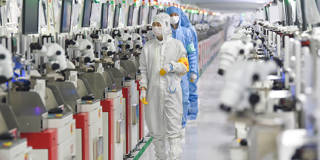The United States and Europe are currently erecting trade barriers to mitigate the perceived threat of Chinese economic coercion. But the underwhelming impact of the unprecedented sanctions imposed on Russia suggests that adopting a similar approach toward China will not yield better results.
MILAN – As the war between Israel and Hamas intensifies, global attention has largely shifted from Ukraine to Gaza. But while this is understandable, it would be a mistake to overlook the situation in Ukraine. With Vladimir Putin’s war of aggression approaching its second anniversary, it is crucial to understand why the unprecedented Western sanctions imposed on Russia have had such a limited effect.
Contrary to analysts’ expectations, the Russian economy has not collapsed as a result of Western sanctions. Instead, it continues to grow, albeit at a slower pace. One obvious reason for this is that demand for Russian exports – particularly oil and gas – remains strong, and these products are fungible. If Europe cuts back on purchasing Russian oil and gas, Russia can find other willing buyers, such as India and China. The largest cost for Russia implied by this shift in trading partners is transport, though the increase amounts to just a few percentage points for oil and other commodities, like coal, gold, copper, and various raw materials.
The notable exception is natural gas, which is more difficult to transport. Before its invasion of Ukraine, Russia was Europe’s biggest energy supplier, providing more than 40% of the European Union’s natural gas. In the summer of 2022, Russia attempted to “sanction” Europe by scaling back and eventually halting its gas deliveries. This resulted in a short-lived spike in global gas prices, compelling European buyers to order much more liquified natural gas from other suppliers and stoking fears that energy shortages would choke off economic growth, particularly in Germany.

MILAN – As the war between Israel and Hamas intensifies, global attention has largely shifted from Ukraine to Gaza. But while this is understandable, it would be a mistake to overlook the situation in Ukraine. With Vladimir Putin’s war of aggression approaching its second anniversary, it is crucial to understand why the unprecedented Western sanctions imposed on Russia have had such a limited effect.
Contrary to analysts’ expectations, the Russian economy has not collapsed as a result of Western sanctions. Instead, it continues to grow, albeit at a slower pace. One obvious reason for this is that demand for Russian exports – particularly oil and gas – remains strong, and these products are fungible. If Europe cuts back on purchasing Russian oil and gas, Russia can find other willing buyers, such as India and China. The largest cost for Russia implied by this shift in trading partners is transport, though the increase amounts to just a few percentage points for oil and other commodities, like coal, gold, copper, and various raw materials.
The notable exception is natural gas, which is more difficult to transport. Before its invasion of Ukraine, Russia was Europe’s biggest energy supplier, providing more than 40% of the European Union’s natural gas. In the summer of 2022, Russia attempted to “sanction” Europe by scaling back and eventually halting its gas deliveries. This resulted in a short-lived spike in global gas prices, compelling European buyers to order much more liquified natural gas from other suppliers and stoking fears that energy shortages would choke off economic growth, particularly in Germany.